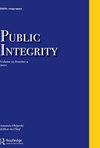A Pedagogical Exploration of Horror as a Teaching Tool for Ethics Using the Case of Saw IV
IF 1.3
Q3 PUBLIC ADMINISTRATION
引用次数: 0
Abstract
AbstractOur case study of Saw IV examines the possibility of using horror as a genre, a vehicle for teaching ethics, and its use in street-level bureaucrat (SLB) decision-making. Specifically, this film highlights the inherent violence of the police state, which illuminates the limits of ethical decision-making in constrained contexts. We propose using horror as a film genre to teach students about the complexity of personal, interpersonal, and professional ethics, bureaucratic discretion, and the impact of these decisions in real-world situations. We provide a brief analysis of the film through the lens of ethical dilemmas in a violent police state and the impact of this violence on governance. We conclude with recommendations for using Saw IV and horror more broadly as pedagogical tools in public administration and political science education.Keywords: Horror filmspedagogydemocratic theorybureaucratic ethics Disclosure statementNo potential conflict of interest was reported by the author(s).Notes1 Maynard-Moody and Musheno define agency roughly as the ability to integrate an understanding of law and procedure with “cultural and moral preferences.”2 Here, we see Rigg aiding and abetting Jigsaw’s game by allowing the continuation of terror to proceed in the community; not saying that Rigg (played by a black actor) is a white supremacist. Instead, we believe Hoffman, who is explicitly corrupt, might be more explicitly a white supremacist and may be motivated to continue the games of Jigsaw to facilitate his nefarious ends in the community.3 Jigsaw’s backstory as a civil engineer and toymaker is explained in earlier films in the series. Jigsaw (real name John Kramer) was married to a woman (Jill) who ran a drug-user recovery clinic. As a married couple, they tried very hard to have a child, and John’s (Jigsaw) flashback scenes provide insight into his care towards his wife and their community. Jigsaw is also revealed to be suffering from cancer and an inoperable tumor. These complications lead to marital strife, eventually leading to divorce. While married, his wife is assaulted by one of the clinic users, leading to a miscarriage of their carefully planned son. In his view, testing a victim’s will to live (and survive tests of physical torture) became his credo due to the course treatment of his wife and child and the powerlessness he felt from his cancer diagnosis.以《电锯惊魂4》为例,对恐怖作为伦理教学工具的教学探索
《电锯惊魂4》的案例研究探讨了将恐怖作为一种类型、一种道德教育工具的可能性,以及它在基层官僚(SLB)决策中的应用。具体来说,这部电影强调了警察国家固有的暴力,这说明了在约束环境下道德决策的局限性。我们建议将恐怖片作为一种电影类型来教导学生关于个人、人际、职业道德、官僚裁量权的复杂性,以及这些决定在现实世界中的影响。我们通过一个暴力警察国家的道德困境,以及这种暴力对治理的影响,对这部电影进行了简要的分析。最后,我们建议在公共管理和政治学教育中更广泛地使用《电锯惊魂4》和恐怖作为教学工具。关键词:恐怖电影教学民主理论官僚伦理披露声明作者未发现潜在的利益冲突注1 Maynard-Moody和Musheno将代理大致定义为将对法律和程序的理解与“文化和道德偏好”相结合的能力。“在这里,我们看到Rigg通过允许恐怖活动在社区中继续进行来帮助和教唆Jigsaw的游戏;而不是说里格(由黑人演员饰演)是白人至上主义者。相反,我们认为霍夫曼显然是腐败的,他可能是一个白人至上主义者,可能会继续玩拼图游戏,以促进他在社区中的邪恶目的竖锯作为一名土木工程师和玩具制造商的背景故事在该系列的早期电影中得到了解释。竖锯(真名约翰·克莱默)的妻子吉尔(Jill)经营着一家戒毒诊所。作为一对已婚夫妇,他们非常努力地想要一个孩子,而约翰(拼图)的闪回场景让我们看到了他对妻子和他们社区的关心。拼图还被揭露患有癌症和无法手术的肿瘤。这些复杂因素导致了婚姻冲突,最终导致离婚。在结婚期间,他的妻子被一名诊所使用者殴打,导致他们精心计划的儿子流产。在他看来,考验受害者的生存意志(并在肉体折磨的考验中幸存下来)成为他的信条,因为他对妻子和孩子的治疗过程以及他因癌症诊断而感到的无力感。
本文章由计算机程序翻译,如有差异,请以英文原文为准。
求助全文
约1分钟内获得全文
求助全文

 求助内容:
求助内容: 应助结果提醒方式:
应助结果提醒方式:


